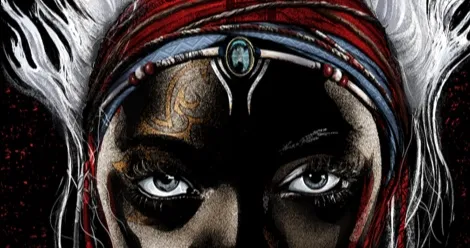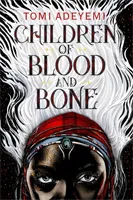
15 Minutes with Tomi Adeyemi at San Diego Comic Con
This content contains affiliate links. When you buy through these links, we may earn an affiliate commission.
Tomi Adeyemi is a creative writing coach and author of the phenomenal YA novel Children of Blood and Bone. A scholar of English Literature and West African mythology, Tomi’s website has been named by Writer’s Digest as one of the 100 best for writers.
She was kind enough to sit down with Book Riot for a few minutes, amidst panels and signings at SDCC, to talk about Children of Blood and Bone, her experiences as a Nigerian American, and what she’s reading now.

 TA: I don’t know if this is other people or just me but I think “you push me and…” We were walking here and this girl, who was white, hands me her trash and goes, “Thank you, have a nice day.” And I was like, “I’m going to fight you but obviously I’m not because I have to go to my signing.” But if she had done that to my sister, or done that to my mom, or one of my friends…I would be late to my signing, we would have some words. I think a lot of times, something can happen to you (and you deal with it) but when someone does something to someone you care about you think, “Okay, you can talk trash to me but you cannot talk trash to someone I love, that I will not allow.” Guilt is one way to phrase it but I think it’s also being motivated by the other…by “maybe I don’t want to do this for myself but I want to do it for my dad.” And, “maybe I’m too scared…” Amari would never do what she did for herself but when something happened to her person…she had to do something. What’s actually driving it is stepping in for someone else.
TA: I don’t know if this is other people or just me but I think “you push me and…” We were walking here and this girl, who was white, hands me her trash and goes, “Thank you, have a nice day.” And I was like, “I’m going to fight you but obviously I’m not because I have to go to my signing.” But if she had done that to my sister, or done that to my mom, or one of my friends…I would be late to my signing, we would have some words. I think a lot of times, something can happen to you (and you deal with it) but when someone does something to someone you care about you think, “Okay, you can talk trash to me but you cannot talk trash to someone I love, that I will not allow.” Guilt is one way to phrase it but I think it’s also being motivated by the other…by “maybe I don’t want to do this for myself but I want to do it for my dad.” And, “maybe I’m too scared…” Amari would never do what she did for herself but when something happened to her person…she had to do something. What’s actually driving it is stepping in for someone else.

BR: Is Children of Blood and Bone based on a specific historical event or is it more of a historical survey?
TA: I think survey is better because it’s an allegory for the modern black experience. For that, I’m using things that are happening today but also things that happened up to 30 years ago. Every obstacle ties to a real event or a real series of events…there’s a lot to pull from.BR: When authors who are not of color try to include characters of color, or cultures of color, they tend to create a monolith. Something a couple of my friends and I noticed watching Luke Cage this season is that they were very nuanced about representing the American Black experience as more than one thing: people from Jamaica, people who just came, people who have been here for a long time. It seems like that was something that was important in Children of Blood and Bone. How did you go about parsing what was most important to you?
TA: People say you’ve got to write honestly and that sounds great but also, what does that mean? I think part of that is knowing there are some things black people go through that are universal and those things are how the world shapes you…if you’re in a racist encounter, they’re not going to say, “Oh, you’re Jamaican, oh, you’re Nigerian; oh, you’re full African American; your ancestors were brought here on slave ships.” That’s not what other people see. In the outside world, we have a kind of universal experience but it also changes depending on whether you’ve grown up in predominantly white spaces or predominantly black spaces… I also look at the household: inside my household, I was Nigerian. Outside my household, I was African American. I met readers the other day who were also Nigerian and asked me if I was going to include Igbo stuff, which is another tribe in Nigeria, because I used a lot of Yoruba stuff, and I said, “Honestly, if I had so much time to research, sure, but I’m not Igbo.” There are universal Nigerian things, like when you do something dumb and your grandmother makes a specific sound, that’s all of us. But the language I use for magic is Yoruba…I can’t do Igbo or Hausa because I don’t know anything about that… It’s about knowing what you do know and what you don’t know and also knowing that if everyone wrote about the same thing, it would still be different. Half of The Hate U Give maybe I could have written because Starr in a predominantly white school, that was my life. But Starr at home, that was not my life. Same with Black Panther. Only Ryan Coogler would have started it with boys playing basketball outside a complex. Ava DuVernay wouldn’t have started it like that… I think people put so much pressure on making a monolithic representation but when you look at the opposite…when you look at one movie with white people…there’s permission to tell a bunch of different stories. I think it’s more about getting into that and realizing that not everything is going to be “all Africans” or “all Nigerians” or “all black people;” this is one story. This is one person or character. You’re going to learn things but you’re not going to learn everything because I (the writer) don’t know everything. It’s impossible to learn everything and a story about everything wouldn’t do well because people connect with individual humans.BR: There’s a lot of guilt in this book of various kinds. Guilt of children and parents, siblings, romantic guilt…why do you think guilt motivates people to become heroes?
 TA: I don’t know if this is other people or just me but I think “you push me and…” We were walking here and this girl, who was white, hands me her trash and goes, “Thank you, have a nice day.” And I was like, “I’m going to fight you but obviously I’m not because I have to go to my signing.” But if she had done that to my sister, or done that to my mom, or one of my friends…I would be late to my signing, we would have some words. I think a lot of times, something can happen to you (and you deal with it) but when someone does something to someone you care about you think, “Okay, you can talk trash to me but you cannot talk trash to someone I love, that I will not allow.” Guilt is one way to phrase it but I think it’s also being motivated by the other…by “maybe I don’t want to do this for myself but I want to do it for my dad.” And, “maybe I’m too scared…” Amari would never do what she did for herself but when something happened to her person…she had to do something. What’s actually driving it is stepping in for someone else.
TA: I don’t know if this is other people or just me but I think “you push me and…” We were walking here and this girl, who was white, hands me her trash and goes, “Thank you, have a nice day.” And I was like, “I’m going to fight you but obviously I’m not because I have to go to my signing.” But if she had done that to my sister, or done that to my mom, or one of my friends…I would be late to my signing, we would have some words. I think a lot of times, something can happen to you (and you deal with it) but when someone does something to someone you care about you think, “Okay, you can talk trash to me but you cannot talk trash to someone I love, that I will not allow.” Guilt is one way to phrase it but I think it’s also being motivated by the other…by “maybe I don’t want to do this for myself but I want to do it for my dad.” And, “maybe I’m too scared…” Amari would never do what she did for herself but when something happened to her person…she had to do something. What’s actually driving it is stepping in for someone else.






